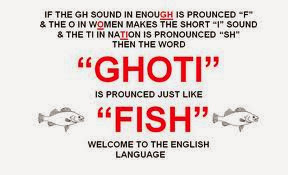I found this in a box of old clippings in my mother's dresser:
A SPELLER'S DELEMMER
If an "S" and an "I" and an "O" and a "U", with an "X" on the end spells "SU",
And an "E" and a "Y" and an "E" spell "I",
Pray, what is a speller to do?
Then, if also an "S" and an "I" and a "G" and an "H", "E", "D" spells "CIDE"
There is nothing on earth for a speller to do but to go and commit:
SIOUXEYESIGHED
It reminds me of the old conundrum usually attributed to George Bernard Shaw, but the first documented usage was by William Oiler:
GHOTI is pronounced "FISH":
The "GH" is pronounced as the "F" sound in "TOUGH"
The "O" is pronounced as the "I" sound in "WOMEN"
The "TI" is pronounced as the "SH" sound in "NATION"
Thus, GHOTI=FISH
Here is another example:
GHOUGHPTEIGHBTEAU is pronounced "POTATO":
"GH" as the "P" sound in "HICCOUGH"
"OUGH" as the "O" sound in "THOUGH"
"PT" as the "T" sound in "PTOMAINE"
"EIGH" as the "A" sound in "NEIGH"
"BT" as the "T" sound in "DEBT"
"EAU" as the "O" sound in "BUREAU"
GHOUGHPTEIGHBTEAU=POTATO
It's not surprising that English is difficult for speakers of other languages to learn.
Just consider these five words ending in "OUGH":
BOUGH rhymes with COW
COUGH rhymes with OFF
ROUGH rhymes with PUFF
THOUGH rhymes with GO
THROUGH rhymes with SHOE


No comments:
Post a Comment